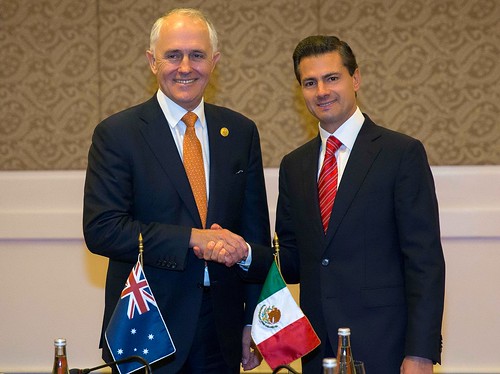At APEC, attendees look to prevent a U.S.-China divorce
APEC #APEC

The Scene
SAN FRANCISCO, Calif. – President Joe Biden twice stressed to a CEO gathering on Thursday that the U.S. was not “decoupling” from China, even if the relationship between the two countries was not all “kumbaya.” Days earlier, Treasury Secretary Janet Yellen said untying the world’s two largest economies would be “damaging” and “destabilizing.”
Chinese leader Xi Jinping, facing his own domestic economic pressures, told business executives that China is a “partner and friend of the U.S.” During a Thursday discussion at the APEC CEO Summit, Ren Hongbin, chairman of the state-backed China Council for the Promotion of International Trade, insisted an upcoming Chinese supply chain exposition would be about “resilience” and not “decoupling.”
Across this week’s Asia-Pacific Economic Cooperation summit and related events, business leaders and officials alike seem united in at least one belief: that the U.S. and China should not separate their economies, and that doing so would be dangerous for the globe.
“I think a stable relationship between the U.S. and China is a win-win situation for everyone,” Carlos Kuriyama, director of APEC’s policy support unit, told reporters during a briefing Sunday. “It makes a lot of sense for them to work together.”
Morgan’s view
I was struck by the level of encouraging talk about the U.S.-China economic relationship at APEC. As a reporter based in Washington, I’m used to hearing lawmakers in both parties criticize China’s trade practices, call for cutting ties with Chinese businesses, and endorse steps that would bolster U.S. industries over those in China.
Take the rhetoric on the 2024 campaign trail, where Republican Nikki Haley has called for revoking normal trade relations with China over the fentanyl crisis and urged U.S. businesses “to leave China as completely as possible.” For candidates, China is a reliable boogeyman in attack ads.
In Congress, Rep. Mike Gallagher, R-Wis., chairman of the House select committee on China, has called for “selective” economic decoupling from China and suggested the administration’s new investment controls targeting China do not go far enough. Lawmakers who favor untying the U.S. economy from China, especially Republicans, tend to view Beijing as a risky actor and an enemy, a country with whom the U.S. could eventually be at war.
Kuriyama argued that the political rhetoric was out of step with the high level of trade between the U.S. and China. “It’s not coinciding with what is happening in reality,” he said.
The true picture is much more complicated. Yes, a complete U.S.-China breakup seems unimaginable. But while U.S. trade with China is still high, it is falling.
The Biden administration is implementing a multibillion-dollar semiconductor law, export controls on advanced chips, and investment restrictions that officials say are all part of an effort to “de-risk” the U.S. economy.
Biden administration officials insist that those moves should not be mistaken for efforts to decouple from China, which has started to retaliate. On Thursday, White House deputy national security adviser Mike Pyle said he welcomed U.S. businesses investing in China, outside of the “very specific areas” where the U.S. has national security concerns.
Biden’s emphasis at APEC seemed to be more about how the U.S. and China can work together. Yellen insisted last week the U.S. wants a “healthy economic relationship” between both nations.
Their comments may encourage business leaders — many of whom are here at APEC — who see value in continuing to do business in China, as well as other countries in the region who would suffer hard choices if Washington and Beijing severed economic ties.
Concerns still simmer. One attendee I spoke with said some business leaders are privately as worried about the criticism they get in the U.S. from doing business in China as they are about actually doing business in China, where some have faced raids and arrests. Some executives were disappointed at the lack of assurances in Xi’s speech, the Wall Street Journal reported. On an August trip to China, Commerce Secretary Gina Raimondo warned that businesses increasingly saw China as “uninvestable.”
The Eurasia Group’s Ian Bremmer warned Thursday that the U.S. and China need to talk more about technology restrictions to ensure the “derisking” doesn’t become a “greater decoupling,” which he opposes. “In that area, the United States and China for now appear to be heading towards a technology Cold War,” he told an audience at the APEC CEO summit.
Room for Disagreement
The U.S. and China are already engaged in “conscious and structural decoupling,” Reuters writes, citing figures showing reduced U.S. investment in China and the continuing impact of the Trump-era China tariffs, which Biden has kept in place.